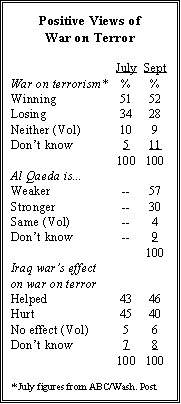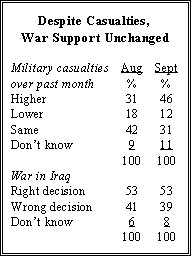Summary of Findings
 Most Americans think that the United States is winning the war on terrorism, and a solid majority believes that Al Qaeda and related terrorist groups are weaker now than they were before the Sept. 11 attacks. In addition, somewhat more Americans believe the war in Iraq has helped the war on terrorism rather than hurt that effort (46% helped, 40% hurt).
Most Americans think that the United States is winning the war on terrorism, and a solid majority believes that Al Qaeda and related terrorist groups are weaker now than they were before the Sept. 11 attacks. In addition, somewhat more Americans believe the war in Iraq has helped the war on terrorism rather than hurt that effort (46% helped, 40% hurt).
The latest nationwide poll by the Pew Research Center for the People & the Press, conducted among 2,003 adults from Sept. 8-13, finds public attitudes on the war in Iraq remaining stable, with a notable exception. Since August, there has been a significant increase in the percentage who say that the number of American military casualties in Iraq is growing. Nearly half (46%) say that casualties over the past month are higher than they have been in recent months; in August, just 31% thought casualties were increasing.
However, the perception that casualties are rising has not materially affected opinion regarding the war itself. A majority of Americans (53%) continue to say the war was the right decision and about as many (54%) favor keeping U.S. troops in Iraq until the situation there has stabilized. These numbers have been consistent since spring.
And perceptions of the Iraq military effort remain unchanged, despite the upswing in casualties. A narrow majority (52%) believe the effort is going very or fairly well, while 44% think it is not going well.
 Moreover, President Bush’s own ratings on Iraq have improved slightly, despite the continuing violence. Currently, 47% of the public approves of the way Bush is handling the situation in Iraq, while 45% disapprove. Voters favor Bush over John Kerry as the candidate better able to handle the situation in Iraq. Bush holds a 51%-39% edge on that issue; the two candidates were virtually tied last month (44% Bush, 46% Kerry).
Moreover, President Bush’s own ratings on Iraq have improved slightly, despite the continuing violence. Currently, 47% of the public approves of the way Bush is handling the situation in Iraq, while 45% disapprove. Voters favor Bush over John Kerry as the candidate better able to handle the situation in Iraq. Bush holds a 51%-39% edge on that issue; the two candidates were virtually tied last month (44% Bush, 46% Kerry).
Nonetheless, the public remains skeptical that Bush has a strategy for bringing the war to a successful conclusion. Just 36% believe Bush has a clear plan to end the war, compared with 55% who believe he does not. Opinion on that measure, like most others on Iraq, has remained very consistent through the spring and summer.


